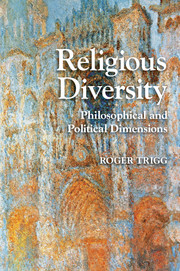Book contents
- Frontmatter
- Dedication
- Contents
- Introduction
- 1 The Challenge of Religious Diversity
- 2 Do Religions Claim Truth?
- 3 Religious Pluralism
- 4 The Roots of Religious Belief
- 5 Does Disagreement Undermine Theism?
- 6 Education and Religious Diversity
- 7 Truth and Coercion
- 8 Religious Diversity and Identity
- 9 Religion as Personal Preference
- 10 Freedom and Religion
- Bibliography
- Index
- References
6 - Education and Religious Diversity
Published online by Cambridge University Press: 05 June 2014
- Frontmatter
- Dedication
- Contents
- Introduction
- 1 The Challenge of Religious Diversity
- 2 Do Religions Claim Truth?
- 3 Religious Pluralism
- 4 The Roots of Religious Belief
- 5 Does Disagreement Undermine Theism?
- 6 Education and Religious Diversity
- 7 Truth and Coercion
- 8 Religious Diversity and Identity
- 9 Religion as Personal Preference
- 10 Freedom and Religion
- Bibliography
- Index
- References
Summary
RELIGIOUS TRUTH IN EDUCATION
Religious commitments essentially involve an acceptance of certain propositions as true. Faith is itself always faith in something or somebody, imagined or real, and the moment it is specified what that is, beliefs are being articulated about what is real. It is not just an arbitrary attitude directed at a void, or an intention to live a particular way of life. That would make it difficult to see why there should be any particular respect for the principled stand a religious believer might wish to take. Conscientious objection typically cannot be just a matter of an idiosyncratic abhorrence of something. It depends, particularly when it is derived from religion, on a sincerely held belief about the nature of the world and what is right or wrong. Those who regard such attitudes as only subjectively valid cannot get to grips with why they are worthy of respect. The American legal philosopher Brian Leiter writes, “Notice that beliefs or the attitudes of believers are central to the analysis of religion precisely because it would be hard to see how mindless, habitual, or merely casual religious practices could claim whatever moral solicitude is due matters of conscience.” Actions that are mere rituals cannot be regarded as different from actions, compulsively repeated for no reason, such as the constant washing of already clean hands. They are left with no significance beyond themselves. Even if they are embedded in a way of life, they are ultimately pointless unless they can be given a purported grounding in some belief about why they matter.
If religious practices make sense only against a given background of belief about what is true, they have to be answerable to human reason. We use our rationality to specify what we believe in, and thereby lay ourselves open to argument and even contradiction. Religion may sometimes seem to put itself beyond the scope of rational discussion, simply because it attempts to deal with the transcendent. Only those in the grip of an ideology that makes science the sole arbiter of reality see anything transcendent that as, by definition, inaccessible. The cognitive structure of the human mind is well equipped to conceive of it, as the cognitive science of religion well illustrates.
- Type
- Chapter
- Information
- Religious DiversityPhilosophical and Political Dimensions, pp. 96 - 113Publisher: Cambridge University PressPrint publication year: 2014

